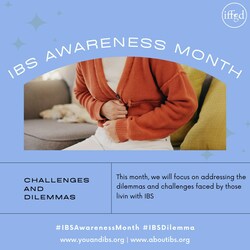International Foundation for Gastrointestinal Disorders (IFFGD) launches #IBSDilemma, a social campaign for Irritable Bowel Syndrome (IBS) Awareness Month this April.
MOUNT PLEASANT, S.C., March 7, 2024 /PRNewswire/ — Irritable bowel syndrome (IBS) affects up to 5-10% of individuals worldwide, making it one of the most common gastrointestinal disorders. Although IBS does not shorten a person’s life span, living with IBS presents a myriad of challenges that can significantly impact one’s quality of life. From navigating social situations to managing work responsibilities, individuals with IBS constantly face dilemmas that others may not fully comprehend. This April, for IBS Awareness Month, IFFGD highlights how crucial it is to shed light on the profound dilemmas and challenges individuals living with this often misunderstood condition may face.

One of the primary dilemmas faced by individuals with IBS is the constant need to plan their lives around their symptoms. IFFGD President, Ceciel T. Rooker, commented, “Simple activities such as dining out with friends, attending social events, or traveling can become sources of stress and anxiety, as uncertainty looms over how their bodies will react.” This fear and discomfort from symptoms can often lead to avoidance behavior, causing individuals to withdraw from social interactions and miss out on valuable experiences.
Irritable bowel syndrome (IBS) is a disorder characterized by two key elements:
- an abdominal component generally described as pain/discomfort and
- alterations in bowel, habits including changes in stool texture and/or frequency.
Changes in stool texture includes experiencing constipation, diarrhea, or both. Constipation is commonly defined as having 3 or fewer bowel movements (BMs) a week, and/or difficulty passing BMs. Diarrhea is defined as loose, watery, or frequent BMs. Other symptoms may also occur, such as bloating, gas, or urgency.
While the physical symptoms of IBS are undoubtedly debilitating, the emotional and psychological toll it takes on individuals cannot be overstated. Additionally, the impact of IBS on mental health cannot be ignored. Studies have shown that individuals with IBS are more likely to experience depression and anxiety, further complicating their ability to cope with the daily challenges of the condition. “The stigma associated with digestive disorders often prevents individuals from seeking support, perpetuating a cycle of silence and suffering,” commented Darren M Brenner, MD. Professor of Medicine (Gastroenterology and Hepatology) and Surgery Northwestern University Feinberg School of Medicine, and IFFGD Board Member.
Furthermore, the lack of understanding and awareness surrounding IBS adds another layer of challenge for those living with the condition. Many individuals struggle to find support from friends, family members, employers, and even healthcare providers who may dismiss their symptoms. But, despite these challenges, it is essential to recognize the resilience and strength of individuals living with IBS. Through education, advocacy, and support, we can empower those affected by IBS to seek help, find community, and lead fulfilling lives despite their obstacles.
April is IBS Awareness Month. This year, help IFFGD and the community raise awareness, promote understanding, and offer compassion to those living with IBS. IFFGD President Ceciel T. Rooker commented, “Together, we can break the silence, challenge stigma, and create a world where individuals with IBS feel seen, heard, and supported.”
IFFGD invites everyone to join their social campaign using #IBSAwarenessMonth and #IBSDilemma. You can also join IFFGD’s awareness campaign by sharing information from the IBS Awareness Month Media Toolkit. Learn more about IBS, visit www.aboutIBS.org or www.youandibs.org to learn about IBS through and animated video series.
About IFFGD
The International Foundation for Gastrointestinal Disorders (IFFGD) is a nonprofit education and research organization dedicated to improving the lives of people affected by gastrointestinal (GI) disorders. www.iffgd.org














